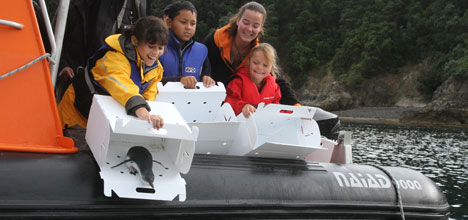Seven little blue penguins returned to their natural habitat at Motiti Island today, completing the last major release into the wild of birds cared for after being oiled by the Rena disaster.
National Oiled Wildlife Response Team coordinator Kerri Morgan says the event is expected to be the last release of multiple birds rescued and treated for oiling.
Catarina Cruz, 11, of Tauranga, Marco Cruz, 10, of Tauranga, Carlijn Bouwman from the wildlife centre, and Zeta Schuler, 7, from Waihi at Motiti Island release penguins. Photo: Maritime New Zealand.
'We still have two birds in care at Massey – one has an injury and the other is going through its moult.
'We will release those birds back into the Bay of Plenty when their health allows it, but the release of the seven Motiti birds this morning is probably the last release we will see of multiple treated birds.”
Members of the NOWRT arrived in Tauranga on October 5, just hours after Rena ran aground, in line with national oil spill response emergency planning.
A large-scale wildlife response was launched on October 6 and a facility built at Te Maunga to treat, rehabilitate and house affected wildlife until their habitats were ready for them to return.
The first wildlife release was held on November 22, and since then, birds have been released back into the wild as their health and their habitats have been signed off as ready by wildlife experts.
At the height of the response, more than 400 birds were being cared for at Te Maunga.
Kerri says wildlife responders from around the country assisted with the response, and teams had been in the field checking for affected wildlife since the first days after Rena grounded.
'Over the past month our field teams have picked up only five oiled birds, despite regularly scouring the affected areas and also following up on reports from the public to the 0800 333 771 oiled wildlife line.
'This is really reassuring as it shows us the amounts of residual oil in the environment are not having a significant effect on wildlife.”
Kerri says it had been hard work, particularly at the height of the response when the sheer numbers of sick and dead birds being collected was at times overwhelming.
A total of 2299 dead birds were collected during the response, 1443 of which were oiled.
'We know this work takes a lot out of people and we do want to acknowledge the wonderful commitment and dedication the entire team has put into this response.”



1 comment
Penguins
Posted on 18-02-2012 19:36 | By bettyce
You have all done a wonderful job. Betty
Leave a Comment
You must be logged in to make a comment.